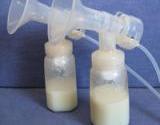Main Menu
Breastfeeding Pumps
If you’re nursing and you’re going to be away from your baby – for example, if you have a full-time job – you may want to make sure your baby still has your milk to drink while you’re apart. You might also want to give others the opportunity to feed your baby – your partner, for example – without giving baby formula. If so, you’ll need a breast pump. This device mimicks the sucking action of a baby, drawing milk out of your breasts and storing it in bottles. You can then attach a nipple to the bottle of breast milk and feed your baby.
Brands of breast pumps include Ameda, Medela and Avent. They range in price from $35 to about $300, depending on whether you purchase a manual or electric pump. You may have to buy the pumping accessories – tubes, breast cones, bottles and filters – yourself. It’s also good to have extra accessories on hand. You’ll need to wash and sterilize bottles, tubes, cones and filters after each use, to get rid of milk residue and possible germs, and you may not want to have to wash all these parts after every use.
There are several different types of breast pumps. Manual breast pumps work without electricity. You put the pump’s cone against your breast, squeeze the handle, and begin producing milk. These pumps work on one breast at a time. They’re very portable, but if you want to pump milk fast, you may want to try an electric pump.
Electric pumps plug into the wall or the cigarette lighter socket in your car. They usually feature two pumps, one for each breast. You hold the cones over your breasts, turn on the machine, and adjust speed and suction controls. In a few seconds, the pump should begin drawing milk out of your breasts. They often come in small, compact bags, so they’re easy to tote around, but you’ll need a source of electricity to use them. You can also buy small bags with gel or plastic ice packs, so you can store your expressed milk in bottles and keep it cool until you’re able to put it in a fridge.
Hospital-grade pumps are also electric, and pump milk faster than store-bought electric pumps or manual pumps. You can usually rent these pumps from hospitals, but you will probably have to buy your own pump accessories.
This information is solely for informational and educational purposes only. The publication of this information does not constitute the practice of medicine, family planning, child psychology, marriage counseling and this information does not replace the advice of your physician or other health care or mental health care provider. Neither the owners or employees of NaturalFamilyOnline.com or the author(s) of site content take responsibility for any possible consequences from any treatment, procedure, exercise, dietary modification, application of medication or any other action involving the care of yourself or any family members which results from reading this site. It is always best to speak with your primary health care provider before engaging in any form of self treatment. Additional information contained in our Legal Statement


